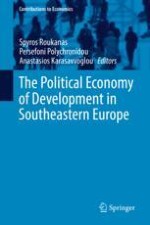This book offers important new insights into recent advances and perspectives in the field of political economy of development in Southeastern European countries. In addition, it provides theoretical and empirical contributions to political economy of development in an international context. Written by authors from Greece, Serbia and Turkey, the book covers a broad spectrum of topics – from macroeconomics and economic policy to international political economy and globalization. Presenting new and original ideas, this is a valuable resource for anyone wishing to gain a deeper understanding of political economy of development in Southeastern Europe: academicians, policymakers and business practitioners.
